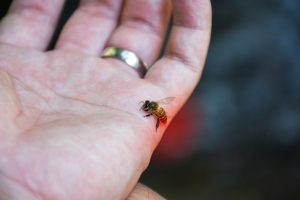 The health impacts from insect stings vary widely. Most people experience pain, itching, redness, and localized swelling, which can be reduced with over-the-counter antihistamines and an ice pack. Cleansing the affected area with soap and water can also help prevent infection.
The health impacts from insect stings vary widely. Most people experience pain, itching, redness, and localized swelling, which can be reduced with over-the-counter antihistamines and an ice pack. Cleansing the affected area with soap and water can also help prevent infection.
Conversely— about two million people in the U.S. (roughly one percent of the population) are hypersensitive to the venom and can have a potentially life-threatening allergic reaction. Signs and symptoms include hives, widespread itching, difficulty breathing or swallowing, swelling of the face, throat, or mouth, dizziness, rapid pulse, and a drop in blood pressure. Since death can occur in a matter of minutes, people experiencing such symptoms should receive medical attention immediately. They should not wait to see if the symptoms go away.
Individuals who are hypersensitive to insect stings are often advised to carry an epinephrine auto-injector (e.g., EpiPen), to be administered immediately after a sting. After the injection, it is still prudent to go to an emergency room to ensure that symptoms do not recur. People who have experienced moderate to severe allergy symptoms, or have been stung repeatedly in the past, should consider being evaluated for hypersensitivity by an allergist or immunologist — a prudent precaution in case they are stung again in the future.

